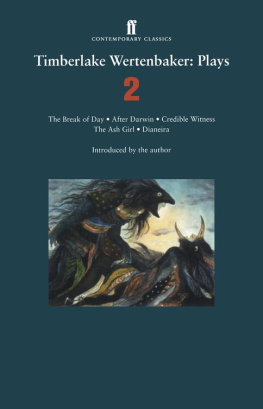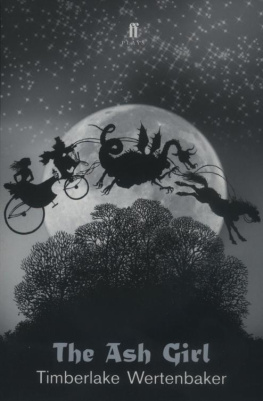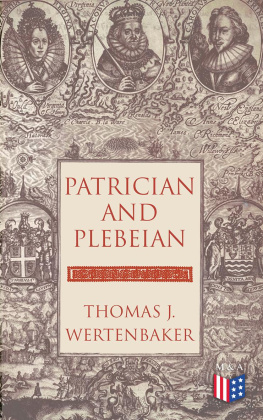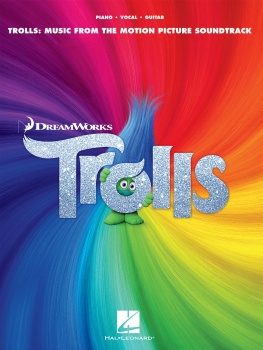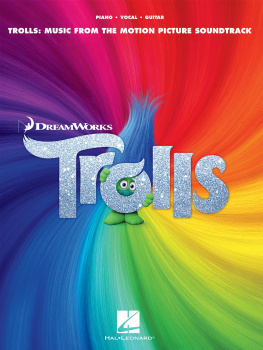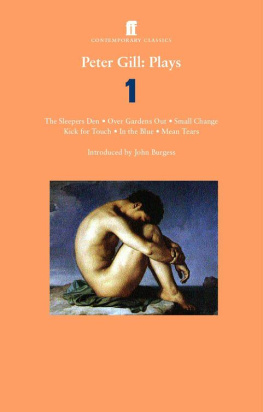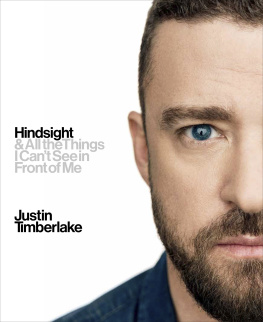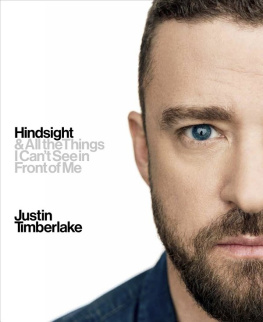If the plays in Volume One were mostly about discovery, discovery of language, of self, of art, the plays in this volume are essentially about identity. In a fluid and rapidly changing world, who are we? Who am I? In
The Break of Day, gender identity is questioned and suffered. Is female identity ultimately bound up with having children? Three women face different options in an uncomfortable setting. Even
After Darwin is about identity. The Captain of
The Beagle, Robert FitzRoy, feels his identity threatened by Darwins discoveries, and the play questions the possibility of moral certainty in a world that lives with the uncertainty of evolution.
The Ash Girl is a fairy tale, the Cinderella story, but Ashgirl has to discover and affirm her own identity before she can find the Prince; and finally,
Credible Witness is totally about identity: national identity and ones freedom within that identity.
Every one of the eleven characters struggles with this troubling question and its emotional consequences. Only Dianeira, originally a radio play inspired by the Trachiniae of Sophocles, does not quite fit and is more about anger than identity, although I think the two are linked. Threatened identity or even troubled identity easily leads to anger. We long for certainty. The feeling of uncertainty is deeply uncomfortable. When not only the outside world but the inside world seem insubstantial, unreliable, that sense of discomfort is acute.
All of these plays were written as one century and one millennium moved into the next. There is a sense of general trepidation, of fear. I felt a sense of discomfort myself, a feeling that the world was trying to redefine itself, no one really knew who they were and even basic assumptions about human beings were coming into question. Its been a curiously uneasy time for Britain, not knowing whether to place itself in Europe or in an Anglo-American paradigm. I felt this acutely, having been educated in France as a European but being of Anglo-American origin. And as I write this, we are in a very different and shifting world marked by 11 September and its consequences.
I feel, then, that I havent finished writing about identity, the area is not totally explored. It does not, however, make for easy plays None of the plays in this volume has easy answers, none had an easy reception, and they are permeated with sadness: the sadness I have felt that in this twenty-first century, in this third millennium, human beings are in trouble in some way. They have lost their certainty. Perhaps it was never really there, but if you look at much of our literature you find periods of confidence and a kind of certainty, you find optimism, a sense of progress even. Perhaps this was lost with Darwin, then lost more profoundly in the twentieth century, partly through an awareness of the limits of science, its own uncertainty; and partly because of the savagery of the wars; then lost again with the fall of political ideologies in 1989; and now with 11 September, when even the rules of hostility have changed. Indeed, when there seem to be no rules.
What does the theatre do in all this? Well, you can batten down the hatches and go domestic. This is interesting and perhaps necessary. Or you can go out into the storm. Its more solitary and scary and there may be fewer with you. When I talk to actors or other practitioners, I find there is a sense of identity crisis in the theatre itself and I have tried to reflect this in a couple of the plays. Too many plays have shown actors as charming, selfish children Ive done it myself.
I wanted to show some of the questioning they themselves go through both with their work and their relations to the world. I still believe the theatre is like some kind of cultural skin. It is the edge between the interior world we inhabit of poetry, language, music, and the exterior public world of other people, a crowd, a group, a polis. That edge, that skin is the point of contact between the audience and the play, it is a totally different experience from reading a book or a poem alone. It is more exposed, often more uncomfortable; ones identity can be put in question. Ive noticed a tendency in the theatre to try to target audiences, gay plays for gay men, womens plays for women, black plays for the black community.
If this succeeds, it will be a great shame. Perhaps, after all, it is not the best thing to have a solid, immutable and unquestioned identity, maybe its more interesting to shed these skins occasionally, maybe its more human to be uncomfortable. And finally, maybe it is more consoling, maybe even more hopeful to be uncomfortable in a diverse group, in an audience. Most of the plays in this volume have large casts. One of my greatest sadnesses is that, to date, each has only had one production. In the past, I have honed my plays through the first two or three productions, maybe a few line changes, sometimes dropping entire scenes.
All of these plays, I feel, would have benefited from second productions some just to be seen by a wider audience. In the present climate, this is almost impossible. Nevertheless, here they are. Reader: I hope you will accept the uncomfortable edges of this work and find interest, even pleasure, in the shifting ground. Timberlake Wertenbaker 27 November 2001
For D.
The Break of Day was first performed by the Out of Joint company at the Haymarket Theatre, Leicester, on 26 October 1995, and in London at the Royal Court Theatre on 22 November 1995 The cast in order of appearance was as follows:
Nina Maria Friedman
Tess Catherine Russell
Hugh Brian Protheroe
Paul Lloyd Hutchinson
April Anita Dobson
Natasha Madlena Nedeva
Jamie David Fielder
Robert Nigel Terry
Nick Barnaby Kay
Marisa Kate Ashfield
MrHardacre Jerome Willis
Mihail Bernard Gallagher
DrGlad Lloyd Hutchinson
Eva Madlena Nedeva
Boian James Goode
DrAttanasov David Fielder
MrStatelov Jerome Willis
DrRomanova Anita Dobson
Victor James Goode
Other characters played by members of the companyDirector Max Stafford-Clark
Designer Julian McGowan
LightingDesigner Johanna Town
Sound Designer John A.
Leonard Musical Director Steven Edis Dialect Coach Jeannette Nelson
NinaTessHughPaulAprilNatashaJamieRobertNickMarisaMr HardacreMihailDr GladEvaBoianDr AttanasovMr StatelovDr RomanovaVictor When I was a little girl, Bout seven years old, I hadnt got a petticoat To keep me from cold. So I went into Darlington, That pretty little town, And there I bought a petticoat, A cloak and a gown.
Hark to me,Listen what I say,Little girls are importantAt the break of day. I went into the woods, And built me a kirk, And all the birds of the air, They helped me to work. The hawk with his long claws Pulled down the stone, The dove with her rough bill Brought me them home.

